|
|
|
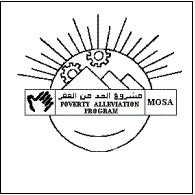 43.
SUPPORT ACTIVITIES – NON
FINANCIAL ACTIVITIES
43.
SUPPORT ACTIVITIES – NON
FINANCIAL ACTIVITIES
3.1. Training needs assessment for the graduated CDAs
This part has been elaborated in point 1.3 of the Coordination section.
3.2. Needs assessment for Minya CDAs/NGOs
The Director
of Minya fully supported by the Program Officer in cooperation with the
Management and the Advisory Committee members, after
setting up the criteria of selection for the CDAs, proposed a roster of 20 CDAs.
This activity lasted about one month involving the gathering of information in
the standard model developed by the Program and the field visits. For the CDAs
inspected a profile has been made and is attached to this report.carried
out the selection of around
5 CDAs. A formal
ceremony was held on the 21st of April at the Governorate meeting
hall, headed by H. E. Governor of Minia, Director of the Italian Cooperation,
MISA Undersecretary, and the program administrators. Board Members, Religious and Representatives of the local communities
participated in this day. During
this ceremony, the second group of four CDAs signed their agreements and
received their
contracts.
3.3. MISA Capacity building
besideBesides
the training provided to MISA staff, specific activities have realized to
enhance the capacity ogf
the Ministry to tackle with poverty issue. MISA library has
been rehabilitated
in collaboration with the fund of the arabArab
league, by providing air conditioning to the premises.
A
computer training center has started to be rehabilitated
and will be provided with state of the art technology including ISDN telephone
line and internetInternet
connection.
This
part has been elaborated in point 1.3 of the Coordination section.
Further
to the Program’s activities, a proposal for the establishment of a MISA
support Unit is being prepared in order to enhance the collaboration among
foreign and Egyptian NGOs, to tackle advantage of the Italian-Egyptian debt swap
resources.
3.4. Technology
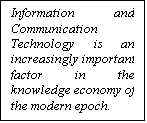 Even
if during the past semester in all the CDA running the Revolving Funds has been
completed the equipment with computer stations with all the accessories, some
problem have been encountered, regarding the performance of the computers
themselves. While the computer courses continued in specialized training
centers, an IT specialist of the Program has started paying regular visits to
every CDA to complete the on the job training and provide any kind of technical
assistance related to hardware and software.
Even
if during the past semester in all the CDA running the Revolving Funds has been
completed the equipment with computer stations with all the accessories, some
problem have been encountered, regarding the performance of the computers
themselves. While the computer courses continued in specialized training
centers, an IT specialist of the Program has started paying regular visits to
every CDA to complete the on the job training and provide any kind of technical
assistance related to hardware and software.
A web page for each CDA has been designed and downloaded in to PAP web page.
Loan Truckingtracking
system
The Program started the collaboration with the IT Company
COMPUBASE for the design and the set of a loan track system for the Revolving
Fund. After numerous attempts to
find an agreement and to adapt the system proposed by the company to the program
requirements and system, PAP decided to change provider. After a market survey,
and after various discussiondiscussions,
visits, the Program selected the ABA association that has a recognized
reputation in the market.
However, view the
remarkable price,
further discussion are still ongoing and the final decision is still to be taken
and
After
a market survey, and after visits and discussions as it did not
respond to the PAP approach requirements.
with the IT Provider COMPUBASE that was designing and testing a loan truck software the Program had to find another Company for the purchasing the loan trucking system for the Program and CDAs. Aalternatives will be explored during the next semester, including the adoption after modification of the social Fund system.
3.5. Gender
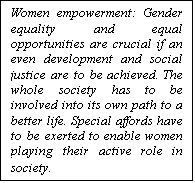 After
receiving one year of non-formal education course through CEDPA’s “ New
Horizon Program”, 431 females in the age bracket 12-40 of six different CDAs
in Giza graduated last May. The Graduation Ceremony hosted by PAP and CEDPA
showed the effectiveness impact of the Program. The participants performed
sketches, songs, poems and success stories on stage. They focused mainly on
women’s rights, gender equality, reproductive health and combating hazardous
health habits and practices.
After
receiving one year of non-formal education course through CEDPA’s “ New
Horizon Program”, 431 females in the age bracket 12-40 of six different CDAs
in Giza graduated last May. The Graduation Ceremony hosted by PAP and CEDPA
showed the effectiveness impact of the Program. The participants performed
sketches, songs, poems and success stories on stage. They focused mainly on
women’s rights, gender equality, reproductive health and combating hazardous
health habits and practices.
The six CDAs in the communities are very interested in replicating the educational program to reach further females in the community. CEDPA started a new training for more facilitators in September. After the training these facilitators will go back to their communities and deliver their experience to other girls and women. The number of trainees will to be increased to produce a widespread impact on the community.
The “New Horizon Program” is very suitable for Minya Governorate with its prevalently rural environment. The replication of the Program in Minya is foreseen as soon as the credit mechanism is set up and is fully working.
In
the framework of the support activities that aim at improving beneficiaries life
condition and quality a library at the Premises of the CDA of Omranya Gharbia
has been established. Setting up a library is a complex and difficult task
which required
particular technical skills. After assessing the real need of the CDA catchments
area in terms of cultural/educational facilities, together with the Board Member
of the CDA were agreed on the opportunity and the utility to setting up library
that could support the schools in the surroundings.
Therefore
the Program in order to set up the library employed a Consultant responsible of
all technical details. Besides the library has been fully equipped with ad hoc
furniture, personnel recruited and formed and now books purchased. In October
the library has been inaugurated at the presence of The Italian Embassy, the
Ministry of MISA Dr. Amina El Ghinda and the Governor of Giza Mr. Mahmoud Abou
Lail, among the other.
3.5. Gender
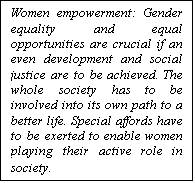 After
receiving one year of non-formal education course through CEDPA’s “ New
Horizon Program”, 431 females in the age bracket 12-40 of six different CDAs
in Giza graduated last May. The Graduation Ceremony hosted by PAP and CEDPA
showed the effectiveness impact of the Program. The participants performed
sketches, songs, poems and success stories on stage. They focused mainly on
women’s rights, gender equality, reproductive health and combating hazardous
health habits and practices.
After
receiving one year of non-formal education course through CEDPA’s “ New
Horizon Program”, 431 females in the age bracket 12-40 of six different CDAs
in Giza graduated last May. The Graduation Ceremony hosted by PAP and CEDPA
showed the effectiveness impact of the Program. The participants performed
sketches, songs, poems and success stories on stage. They focused mainly on
women’s rights, gender equality, reproductive health and combating hazardous
health habits and practices.
The six CDAs in the communities are very interested in replicating the educational program to reach further females in the community. CEDPA started a new training for more facilitators in September. After the training these facilitators will go back to their communities and deliver their experience to other girls and women. The number of trainees will to be increased to produce a widespread impact on the community.
The “New Horizon Program” is very suitable for Minya Governorate with its prevalently rural environment. The replication of the Program in Minya is foreseen as soon as the credit mechanism is set up and is fully working.
Major Achievements
1-
Details
of Non-Financial
Activities
In
order to improve the quality of life for poor families, PAP has given special
attention to address other community basic needs; PAP assisted the CDAs to form
committees and trained them on how to:
1-
Conduct Community Needs Assessment (CNA) in order to identify urgent
basic community needs.
2-
Design projects and develop project proposals to address these needs.
3-
Implement,
monitor, and evaluate community development activities based on the identified
community needs.
Community
needs assessment processes were conducted in rural and urban Giza communities,
which are: El-Desemey, Dahshour, Abo-Ragwan, and Omraneia Gharbeia. The results
of the needs assessment confirmed 6 basic community needs, which are as
follows:
1-
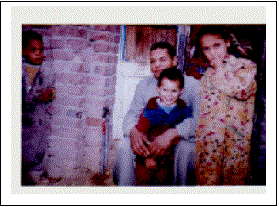 Need
for Tap Water:
High number of families do not have access to tap water, and they are drinking
contaminated pump water, or they get tap water either from their neighbors, or
from few public tap water.
Need
for Tap Water:
High number of families do not have access to tap water, and they are drinking
contaminated pump water, or they get tap water either from their neighbors, or
from few public tap water.
2-
Need
for Proper Sanitary system:
High number of families do not have access to hygienic sanitary systems
3-
Women
Need for Having Identity Cards:
High number of women in these communities does not have Identity Cards, and
though, they do not have access to governmental and non-governmental services.
4-
Women
Need for having Birth Certificate to become able to issue IDs.
5-
Large
Number of Women & Children are exposed
to smokes coming out of the traditional Bread Ovens.
6-
Community
Culture and Education Enhancement
During
this reporting period, PAP signed 10 agreements with 4 CDAs , (El-Desemey,
Dahshour, Abo-Ragwan and Omraneia Gharbeia) in order to address the above
identified community needs.
total of 4,241 families representing more than 15,800 people have directly benefited from these activities, out of that, 564 extended families have connected tap-water to their houses after having been drinking contaminated water, 36 extended families have their own hygienic sanitary system, and finally, other 3,641 poor women have
had
access to basic governmental and non-governmental services after having
issued their identity cards.
Addressing
water needs in three communities:
To
address the community water needs, PAP started implementing water projects with
EL-Desemey, Dahshour, and Abo Ragwan CDAs to help an initial number of 191 in
El-Desemey, 611 families in Dahshor and 275 families in Abo-Ragwan to connect
tap water from the main water pipeline to their houses.
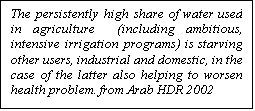
In
order to reach a holistic approach and to maximize the benefits of the limited
financial resources, and mainly to enhance the financial capability of the CDA,
PAP granted the amount of LE. 90,000 for the above
mentioned CDAs (LE. 30,000 per each) to run a credit mechanism. Each
CDA is to use this amount to disburse loans of LE 300 to targeted beneficiaries
with 7% as annual administrative fees. The loan is to be paid back in 16-month
period. Then the CDA will revolve the collected installments to other
beneficiaries and so on.
The
time writing this report, a total of 564 families in three villages (186
families in El-Desemey, 257 families in Dahshour and 121 families in Abo-Ragwan
villages have already connected tap water in to their houses, they feel a
fundamental change have occurred to their living condition.
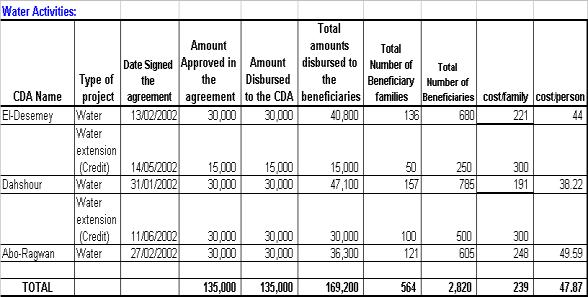
Moreover,
PAP applied a new approach that aims at:
- Building
the CDA capability to deliver services to the community members;
- Speeding-up
the tap-water connection process to a wider number of the targeted families.
- Changing
the CDAs’ attitude to become rather fund-raisers than grant recipients.
To
reach that, PAP disbursed additional amounts (as credit) to both
Dahshour (LE. 30,000) and
El-Desemey (LE.15,000). The two CDAs will use this money for water loans and will
pay back to PAP the principal
only, in ten
equal monthly installments, the 2 CDAs will benefit of gaining the
interest (7%). The time writing this report, both CDAs have repaid two
installments each.
As
a result of the revolving of water loan fund, the number of beneficiary families
is increasing and thus, the water installation cost per family is getting
reduced, it is supposed to be LE. 300, but because of revolving the water fund,
the average cost of PAP investment has reduced to become LE. 239.
Addressing
sanitary needs:
Before
intervening in sanitary problems, it was obvious that it is a very technically
sound problem, it needs bigger amounts of financial resources than available to
address, and moreover, people must be aware of the importance of having sanitary
system in their houses.
To intervene in such complicated area;
 First,
PAP hired a technical consultant to assess the technical aspects of a low-cost
sanitary system, the consultant visited the three villages, he defined the
quality of soil, the level of the table-water, the density of the population and
other technically related factors, and he provided a complete report with
different alternatives for low-cost sanitation where the cost varies from
LE.1,800 up to LE.50,000, also the consultant recommended the cheapest one (LE.
1,800).
First,
PAP hired a technical consultant to assess the technical aspects of a low-cost
sanitary system, the consultant visited the three villages, he defined the
quality of soil, the level of the table-water, the density of the population and
other technically related factors, and he provided a complete report with
different alternatives for low-cost sanitation where the cost varies from
LE.1,800 up to LE.50,000, also the consultant recommended the cheapest one (LE.
1,800).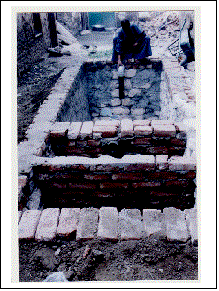 The
recommended sanitation system consists of a three chambers’ septic tank
connected with up-flow filter.
The
recommended sanitation system consists of a three chambers’ septic tank
connected with up-flow filter.
PAP
decided to pilot this sanitation system in Dahshour community only, though it is
to be replicated in other communities if it is successful.
In
order to reach a holistic approach and to maximize the benefits of the limited
financial resources, and mainly to enhance the financial capability of the CDA,
PAP allocated the amount of LE. 30,000 to Dahshour CDA to run a credit
mechanism. The CDA is to use this amount to disburse
loans of LE 800 (about 45% of the cost of the septic tank) to each beneficiary
family (extended families) with 7% as annual administrative fees. The loan is to
be paid back in 18 months period. The monthly installment is about LE. 50.
2. The time writing this report, 36 extended families have constructed their own septic tanks, which allowed them to save money previously used to dislodge sit pit.
| Copyright
© 1999 Poverty Alleviation And Employment Generation Program Web Designer : Ahmed Salem Last Update: May 26/09/2002 |